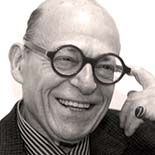 Richard Joseph Howard (October 13, 1929 – March 31, 2022; adopted as Richard Joseph Orwitz) was an American poet, literary critic, essayist, teacher, and translator. He was born in Cleveland, Ohio, and was a graduate of Columbia University, where he studied under Mark Van Doren, and where he was an emeritus professor. He lived in New York City.
Richard Joseph Howard (October 13, 1929 – March 31, 2022; adopted as Richard Joseph Orwitz) was an American poet, literary critic, essayist, teacher, and translator. He was born in Cleveland, Ohio, and was a graduate of Columbia University, where he studied under Mark Van Doren, and where he was an emeritus professor. He lived in New York City.
AN OLD DANCER
Richard Howard
Because there is only one of you in all of time … the world will not have it …
— Martha Graham
Your props had always been important:
Preposterous poniards, rings and thorns,
Things without a name you fell upon
Or through. Now they are your props indeed.
Take that iron prong you dangle from,
Strung up, slung like a sick animal
Who used to rise as straight as any tree
Without such corporal irony.
Propped then, you make no bones, or only
Bones, of husbanding your strength. For strength
Was your husband, and you’re widowed now.
The face that was a mask of wonder
Wizens into the meaninglessness
Of some Osaka marionette,
And there is properly little more
That you can do for us than think.
What thoughts are yours, or were yours when
Half-visionary and half-voyeur
You tore the veils from Remembered Women,
Rarely lovely, except as the space
That took them into its hugest mouth
Makes any movement lovely: at first
It was enough for you to be them,
Violent, often vague as they come,
Until the years and the work of years
Led you beyond being into more
Than self supplied: now you must review
What you have been and let the others
Do. What you were a whole theater
Has become. What have you lost by that
Exchange, save as the tree loses by
Giving up its leaves and standing bare?
O Dancer, you have lost everything,
Shuddering on your iron gallows-tree.
Bane, bone and violence, you answer
Yeats in kind, unkindest witch of all:
“We know the dancer from the dance” by age,
By growing old. The dance goes on,
The dancers go, and you hang here
Like stale meat on your dead steel branch.
=======
GIOVANNI DA FIESOLE ON THE SUBLIME,
or FRA ANGELICO’s LAST JUDGMENT
Richard Howard
How to behold what cannot be held?
Start from the center and from all that
lies or flies or merely rises left
of center. You may have noticed how
Hell, in these affairs, is on the right
invariably (though for an inside Judge,
of course, that would be the left. And we
are not inside.) I have no doctrine
intricate enough for Hell, which I leave
in its own right, where it will be left.
Right down the center, then, in two rows,
run nineteen black holes, their square lids off;
also one sarcophagus, up front.
Out of these has come the world; out of
that coffin, I guess, the Judge above
the world. Nor is my doctrine liable
to smoothe itself out for the blue ease
of Heaven outlining one low hill
against the sky at the graveyard’s end
like a woman’s body-a hill like Eve.